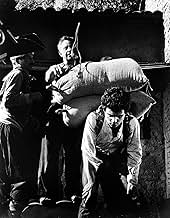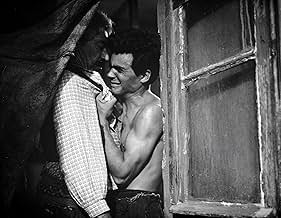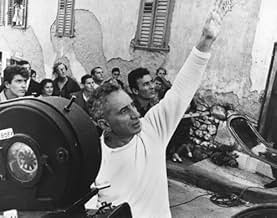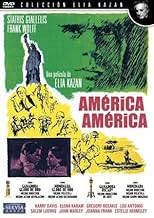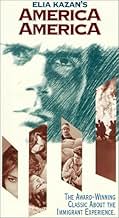VALUTAZIONE IMDb
7,7/10
6315
LA TUA VALUTAZIONE
Un giovane greco si ferma su una rotta sicura per l'America.Un giovane greco si ferma su una rotta sicura per l'America.Un giovane greco si ferma su una rotta sicura per l'America.
- Regia
- Sceneggiatura
- Star
- Vincitore di 1 Oscar
- 7 vittorie e 12 candidature totali
Garrett Cassell
- Dog Walker
- (non citato nei titoli originali)
Tom Holland
- Voice Overs
- (voce)
- (non citato nei titoli originali)
Elia Kazan
- Self
- (voce)
- (non citato nei titoli originali)
Recensioni in evidenza
While I am not sure I'd consider this to be Elia Kazan's best film, it certainly ranks up there with his best--which is saying a lot considering he's the same guy who brought us "On The Waterfront", "A Streetcar Named Desire" and "Rebel Without a Cause". As for Kazan himself, this was his favorite film as it's the story of his uncle--a man who busted his butt to get himself to America around the turn of the century.
When the movie begins, Kazan himself narrates and explains that the story is about the man who is responsible for him and his family immigrating to the US. His story begins in Turkey. It's around the time in history when the Turks were about to wipe out most of the Armenians--and things for other minorities in their land (in this case, the Greeks) weren't very good either. So, a family decides to send their oldest son, Stavros (Stathis Giallelis), to Constantiople to earn his fortune--and to be able to afford to eventually bring them all to America...and freedom. Stavros is a very, very determined man...but also quite naive. Again and again, he's used by people and left with nothing. But, he's an amazingly resilient guy and soon he's willing to do just about anything to make the money he needs to take the ship to America.
While the story is rather simple, it's handled exquisitely. You can really tell that it's a labor of love, as the story unfolds very slowly and patiently. This is NOT a complaint-just a statement about the writer/director's style in the movie. It's really great what he was able to achieve with mostly inexperienced actors and non-actors. Perhaps Giallelis' performance is a bit too quiet and even stilted...but it is hard to imagine that he wasn't even an actor! Overall, it's a beautiful tale--and one of the most American of movies because it tells a story of immigration that most of us in the US can relate to. Even though my family was not Greek, so much of the rest of the film is pretty typical of what other poor families like my own probably went through on their way to a new land. Well worth seeing and a nice history lesson.
When the movie begins, Kazan himself narrates and explains that the story is about the man who is responsible for him and his family immigrating to the US. His story begins in Turkey. It's around the time in history when the Turks were about to wipe out most of the Armenians--and things for other minorities in their land (in this case, the Greeks) weren't very good either. So, a family decides to send their oldest son, Stavros (Stathis Giallelis), to Constantiople to earn his fortune--and to be able to afford to eventually bring them all to America...and freedom. Stavros is a very, very determined man...but also quite naive. Again and again, he's used by people and left with nothing. But, he's an amazingly resilient guy and soon he's willing to do just about anything to make the money he needs to take the ship to America.
While the story is rather simple, it's handled exquisitely. You can really tell that it's a labor of love, as the story unfolds very slowly and patiently. This is NOT a complaint-just a statement about the writer/director's style in the movie. It's really great what he was able to achieve with mostly inexperienced actors and non-actors. Perhaps Giallelis' performance is a bit too quiet and even stilted...but it is hard to imagine that he wasn't even an actor! Overall, it's a beautiful tale--and one of the most American of movies because it tells a story of immigration that most of us in the US can relate to. Even though my family was not Greek, so much of the rest of the film is pretty typical of what other poor families like my own probably went through on their way to a new land. Well worth seeing and a nice history lesson.
"America, America" is a movie made with the soul. It is a hair-raising movie about the immigrant experience, made by artists temporarily outside the Hollywood cage. It is about the struggle to be human in a world that bites at you, and it is about naked desire. "America, America" is a film about a young man with ichor in his arteries, made by people with ichor in their arteries.
Stavros is a young Greek from Anatolia, a youth with burning eyes, full of ethos as well. He yearns to live a life away from degradation (Greeks in Anatolia were a despised minority). This movie shows his peregrination to America, in three of the shortest hours I've ever lived. It shows a cycle of being broken and rebuilt over and again, the death of illusions, the obduracy of hope, and the rack of desire.
Haskell Wexler deserves special mention as he quite frequently produced jaw-dropping shots in this movie. There is a scene in this movie where Stavros is sat next to an older woman, Sophia (sat together like panthers watching an ape play with jackals), and the electricity between them, established entirely visually, is a devastation.
The editing from Dede Allen, is similarly special, and you can see that Kazan acknowledged all this creative talent as he reads out all the names of the major creative staff at the end over the credits. One particularly beautiful effect was a dissolve the last time we see Stavros' mother, where her face persist on the screen for a moment, almost as if she has become a ghost.
You absolutely must see this movie.
Stavros is a young Greek from Anatolia, a youth with burning eyes, full of ethos as well. He yearns to live a life away from degradation (Greeks in Anatolia were a despised minority). This movie shows his peregrination to America, in three of the shortest hours I've ever lived. It shows a cycle of being broken and rebuilt over and again, the death of illusions, the obduracy of hope, and the rack of desire.
Haskell Wexler deserves special mention as he quite frequently produced jaw-dropping shots in this movie. There is a scene in this movie where Stavros is sat next to an older woman, Sophia (sat together like panthers watching an ape play with jackals), and the electricity between them, established entirely visually, is a devastation.
The editing from Dede Allen, is similarly special, and you can see that Kazan acknowledged all this creative talent as he reads out all the names of the major creative staff at the end over the credits. One particularly beautiful effect was a dissolve the last time we see Stavros' mother, where her face persist on the screen for a moment, almost as if she has become a ghost.
You absolutely must see this movie.
Kazan's reputation seems to have been diminishing for some time, a process, ironically, that his 'Lifetime Achievement' Oscar seems to have accelerated. Yeah, he did betray his fellows and himself in the 1950s. Again, ironically, it's the films he made later in his career, which show the scars of his loss of self-esteem, which are the most fascinating - WILD RIVER, SPLENDOR IN THE GRASS, THE ARRANGEMENT - and most powerful of them all, AMERICA AMERICA.
I too am surprised that this monument to Americanism and monument of American cinema, seems not very widely known in America itself. It has all the values of classic American cinema - a strong, simple narrative, a limpid visual style which eschews any directorial histrionics to concentrate purely on the characters. It is the story of young men driven from their homeland and making the long voyage to America - the huddled masses yearning to be free. The journey is long and terribly hard, and even as the shore of American comes into view, sacrifices still have to be made. The end of the film is enormously powerful, one of the most moving I have ever seen - the effect is still with me now, 30 years after seeing it.
It is the story of Kazan's father and uncle - the character who makes an appearance, played by Richard Boone, in Kazan's more heavily fictionalised subsequent film THE ARRANGEMENT. It is a personal story, and the simplicity of the telling seems like the end of a process of endless re-telling around smokey fireplaces, and before children go to sleep, a family saga which has almost attained the status of myth. The savagery of the film's first hour, and the dream-like quality of the last act make AMERICA AMERICA a genuine and powerful part of American mythology.
So don't torture yourself about whether Kazan was morally and politically wrong in betraying his colleagues - see AMERICA AMERICA, and you'll see why he could never have acted any differently. Yes, he was a radical, and a leftist, and a deeply intelligent and passionate man; but he was also an immigrant - and his horror of disenfranchisement and ejection overcame his moral and political views. Kazan may criticise aspects of its culture and politics, but he loves and respects and is grateful to America above all. So he made his choice. He could have made no other.
I too am surprised that this monument to Americanism and monument of American cinema, seems not very widely known in America itself. It has all the values of classic American cinema - a strong, simple narrative, a limpid visual style which eschews any directorial histrionics to concentrate purely on the characters. It is the story of young men driven from their homeland and making the long voyage to America - the huddled masses yearning to be free. The journey is long and terribly hard, and even as the shore of American comes into view, sacrifices still have to be made. The end of the film is enormously powerful, one of the most moving I have ever seen - the effect is still with me now, 30 years after seeing it.
It is the story of Kazan's father and uncle - the character who makes an appearance, played by Richard Boone, in Kazan's more heavily fictionalised subsequent film THE ARRANGEMENT. It is a personal story, and the simplicity of the telling seems like the end of a process of endless re-telling around smokey fireplaces, and before children go to sleep, a family saga which has almost attained the status of myth. The savagery of the film's first hour, and the dream-like quality of the last act make AMERICA AMERICA a genuine and powerful part of American mythology.
So don't torture yourself about whether Kazan was morally and politically wrong in betraying his colleagues - see AMERICA AMERICA, and you'll see why he could never have acted any differently. Yes, he was a radical, and a leftist, and a deeply intelligent and passionate man; but he was also an immigrant - and his horror of disenfranchisement and ejection overcame his moral and political views. Kazan may criticise aspects of its culture and politics, but he loves and respects and is grateful to America above all. So he made his choice. He could have made no other.
I saw America America way back when I was a teen and had not seen it since till
today. I was surprised at how much I remembered of it. It was like reliving tales
told by my grandparents and some of their siblings of their immigration stories.
In this case this was fashioned tales of Elia Kazan's parents and their siblings woven together to create an immigrant story. It's not pretty at times and the black and white cinematography accents the harshness of the experience.
Kazan's protagonist is young Stathis Giallelis and a few familiar character actors are in the cast. No box office names though to accent the reality of the story. Giallelis is a Greek in Turkish Anatolia, a place where during the Ottoman Empire persecuting Greeks and Armenians was a national pasttime. Not that persecution led to any kind of solidarity, the two minorities had it in for each other as much as the Turks.
Giallelis hears of America, a fabled land where this sort of organized persecution and permanent status at the bottom of society doesn't happen. He resolves to go, but his family only sends him as far as Istanbul (as Greeks they still call it Constantinople)to help out one of the relatives.
He hears the fare is 110 English pounds and one way or another he's going.
The last 15 minutes or so is when Giallelis arrives and there's a compelling montage of immigrants including our protagonist doing all kinds of menial jobs that we who are here won't do. It's no different today with the current folks who want to come here, the ones our current administration is bent on scapegoating for its own purposes. Look folks, that montage tells more than the Kazan family story. it's your story or mine unless you were born an American Indian.
And speaking for the Kogans, Lucyshyns, Scrobacks, and Fleischmans, I'm glad Elia Kazan made America America and told the tale.
In this case this was fashioned tales of Elia Kazan's parents and their siblings woven together to create an immigrant story. It's not pretty at times and the black and white cinematography accents the harshness of the experience.
Kazan's protagonist is young Stathis Giallelis and a few familiar character actors are in the cast. No box office names though to accent the reality of the story. Giallelis is a Greek in Turkish Anatolia, a place where during the Ottoman Empire persecuting Greeks and Armenians was a national pasttime. Not that persecution led to any kind of solidarity, the two minorities had it in for each other as much as the Turks.
Giallelis hears of America, a fabled land where this sort of organized persecution and permanent status at the bottom of society doesn't happen. He resolves to go, but his family only sends him as far as Istanbul (as Greeks they still call it Constantinople)to help out one of the relatives.
He hears the fare is 110 English pounds and one way or another he's going.
The last 15 minutes or so is when Giallelis arrives and there's a compelling montage of immigrants including our protagonist doing all kinds of menial jobs that we who are here won't do. It's no different today with the current folks who want to come here, the ones our current administration is bent on scapegoating for its own purposes. Look folks, that montage tells more than the Kazan family story. it's your story or mine unless you were born an American Indian.
And speaking for the Kogans, Lucyshyns, Scrobacks, and Fleischmans, I'm glad Elia Kazan made America America and told the tale.
The picture talks about a Greek young from Anatoly ( Turkey ) named Stavros ( Stathis Giallelis ). He is sent by his father to Constantinopla for helping their family . Howewer Stavros only thinks on America . Across the journey he will suffer several misfortunes , risks and odds in his relationships to friends (Frank Wolff, John Marley, Lou Antonio) and enemies . Later on , Stavros will work in laborious employments to obtain a passage in a splendid ship for the promised land.
The movie is a magnificent adaptation based on the autobiographic novel of Greek-Turkish director Elia Kazan who being a child emigrated along with his family to United States . Since the initiating he describes memories , emotions and infancy images , besides narrates the persecution to Greeks and Armenians by Turkish that finished in genocide . Kazan reflects the particular characters , rural sets in realism way , folkloric customs , glimmer landscapes as well as interior homes . Kazan achieved a real emotion and sensibility by means of slow-moving scenes and close-ups of protagonists full of dialogs dealing with essential feeling as familiar love , friendship or happiness . These images contrast with the breathtaking outdoors of the mountains and countrysides where are developed the events . Magnificent cinematography in black and white by Haskel Wexler . Awesome and evocative musical score in oriental style by Manos Hadjidakis ( Topkapi ). The motion picture is very well directed by Elia Kazan ( On the waterfront ) . The release won Academy Award , an Oscar for production design and attained three nominations referred to Director and original screenplay , plus obtained a Golden Globe for Director and the biggest prize in Festival of San Sebastian . Rating : Above average and astounding movie. Well worth watching .
The movie is a magnificent adaptation based on the autobiographic novel of Greek-Turkish director Elia Kazan who being a child emigrated along with his family to United States . Since the initiating he describes memories , emotions and infancy images , besides narrates the persecution to Greeks and Armenians by Turkish that finished in genocide . Kazan reflects the particular characters , rural sets in realism way , folkloric customs , glimmer landscapes as well as interior homes . Kazan achieved a real emotion and sensibility by means of slow-moving scenes and close-ups of protagonists full of dialogs dealing with essential feeling as familiar love , friendship or happiness . These images contrast with the breathtaking outdoors of the mountains and countrysides where are developed the events . Magnificent cinematography in black and white by Haskel Wexler . Awesome and evocative musical score in oriental style by Manos Hadjidakis ( Topkapi ). The motion picture is very well directed by Elia Kazan ( On the waterfront ) . The release won Academy Award , an Oscar for production design and attained three nominations referred to Director and original screenplay , plus obtained a Golden Globe for Director and the biggest prize in Festival of San Sebastian . Rating : Above average and astounding movie. Well worth watching .
Lo sapevi?
- QuizOf all the films he had directed, this one was Elia Kazan's favorite film, as it was very personal to him.
- BlooperAn old woman is humming a tune from Astor Piazzolla's Libertango in the 1900s, decades before the composer was even born.
- Citazioni
Elia Kazan: [Voice- over] My name is Elia Kazan. I am a Greek by blood, a Turk by birth and an American because my uncle made a journey.
- Curiosità sui creditiDirector Elia Kazan narrates the main portion of the closing credits, reading the words as they appear on the screen, using complete sentences such as "The cinematography was by Haskell Wexler."
- ConnessioniEdited into Grand format: Amérique, notre histoire (2006)
- Colonne sonoreExcitement In The Village
I più visti
Accedi per valutare e creare un elenco di titoli salvati per ottenere consigli personalizzati
- How long is America America?Powered by Alexa
Dettagli
- Tempo di esecuzione
- 2h 54min(174 min)
- Colore
- Proporzioni
- 1.85 : 1
Contribuisci a questa pagina
Suggerisci una modifica o aggiungi i contenuti mancanti







